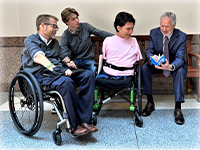2021 Legislative & Annual Report: Children & Their Families
4 minute read
New to the team this session, but already a heavy-hitter in children's advocacy, Advocacy Director Jolene Sanders-Foster led CTD's work on a range of bills to support toddlers and young children with disabilities, special education students, and their families and educators.
Special Education
When the pandemic hit and schools were forced to shutter their doors, many students with disabilities lost services or saw those services put on hold as districts pivoted to virtual learning. For some students, access to technology and learning on a virtual platform were significant barriers. Early on in the pandemic, state agencies acknowledged the anticipated need for compensatory services for many students. We are grateful to report that the Legislature responded to this need by passing the COVID Special Education Recovery Act, SB 89 (Menéndez). SB 89 will require a school district to prepare a supplement to include in a student’s IEP regarding whether special services were affected by the pandemic. The supplement documents whether the provision of special services to the child during the 2019-2020 or 2020-2021 school year was interrupted, reduced, delayed, suspended, or discontinued, as well as whether compensatory services are needed.
HB 159 (M. González) will amend current law relating to improving training and staff development for primary and secondary educators to enable them to more effectively serve all students. It provides the training educators need to teach all students by updating the requirements of educator preparation programs to integrate instruction on topics relating to special education. This bill also enhances requirements for educator certification.
 HB 1252 (Moody) extends the statute of limitations on a special education due process hearing from one year to two years, which aligns with federal language and the vast majority of other states. The new limit will go into effect September of 2022, allowing parents of students with disabilities and their advocates a practical amount of time to prepare for due process actions. Left, CTD's Dennis Borel and Chase Bearden plan office visits in the halls of the Capitol with self-advocates Aiden Armstrong and Edgar Pacheco, Jr.
HB 1252 (Moody) extends the statute of limitations on a special education due process hearing from one year to two years, which aligns with federal language and the vast majority of other states. The new limit will go into effect September of 2022, allowing parents of students with disabilities and their advocates a practical amount of time to prepare for due process actions. Left, CTD's Dennis Borel and Chase Bearden plan office visits in the halls of the Capitol with self-advocates Aiden Armstrong and Edgar Pacheco, Jr.
School Discipline & Safety
A Behavior Intervention or Improvement Plan (BIP) is a component of some special education students' individualized education plans (IEP). The BIP guides educators and staff in identifying, preventing, and responding to behaviors that impact a student’s functional and academic achievement. Currently, BIPs are often only reviewed every three years, which advocates for special education students have long argued is not often enough to best serve the students they were created for.
HB 785 (Allen) requires BIPs in schools to be reviewed at least annually, as needed, or revised if found not to be effective. A student’s BIP must be reviewed prior to disciplinary action that recommends more restrictive placements, such as Disciplinary Alternative Education Programs, Juvenile Justice Alternative Education Programs, or expulsion. The bill also establishes requirements for schools after each incidence of restraint used on a student.
Special education advocates had been working to pass the BIP bill for the last two sessions, making this a hard-fought win.
Other bills regarding the safety of students with disabilities in public school settings may have a similarly long journey. These did not pass:
- SB 414 (Lucio), which would have revised penal code 9.62 to limit the justification of use of force on students by educators. This bill would have clarified that use of force cannot deprive a student of a basic human need and that it may not include aversive techniques that are prohibited. It also would have defined that use of force is justified only to maintain safety in an emergency situation and that it is not a form of discipline.
- HB 2297 (Allen), which would have prohibited the use of undocumented, school-initiated early pickups of students, or informal removals/ shortened school days.
- HB 2975 (Hull), No Kids in Cuffs, which would have eliminated the use of certain restraints on students under 10 years of age. This would have prohibited physical restraint of or use of chemical irritants on public school students by peace officers and school security personnel.
Inclusive Child Care
HB 168 (M. González), which did not pass, would have promoted inclusive child care by:
- revising child care licensing minimum standards for child care providers to clarify responsibilities under the ADA preventing discrimination based on disability
- revising preservice and annual training requirements for providers to include working with children with disabilities and supporting early childhood mental health
- ensuring Early Childhood intervention providers are able to serve babies and toddlers while in child care.
2021 Legislative & Annual Report
Legislative Report
- State Budget
- Voting
- Access to Care
- Access to Medications
- Civil Rights
- Children with Disabilities and Their Families
- Criminal Justice
- Mental Health and IDD Services
- Parking
Annual Report
2021 By the Numbers
- 103 Bills worked on
- 4,864 emails and tweets sent by CTD members to 114 legislators and staffers
- $945,885,821 moved in state budget
- 42 Advocacy partners
- 23 Workgroups/ advisory boards
- 1,120 Participants in advocacy education
- 27 Partner sign-on letters
- 33 Media Hits


